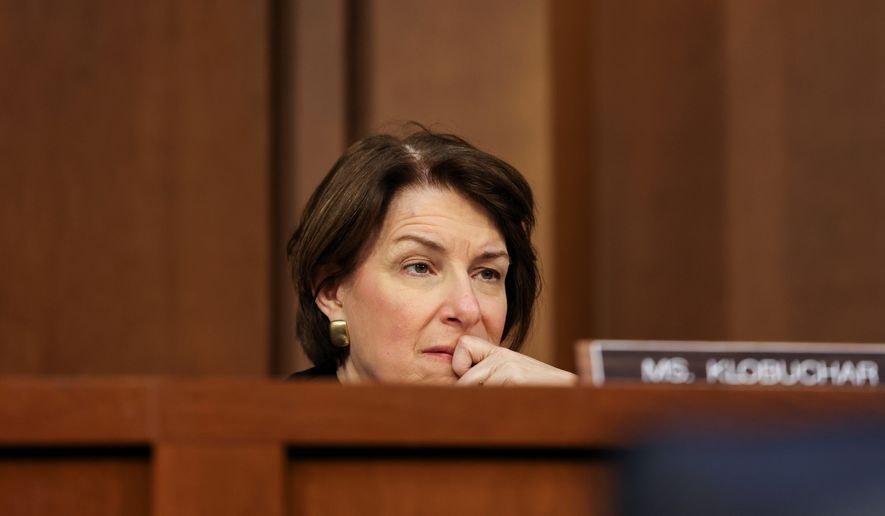The Senate Judiciary Committee voted Thursday to advance antitrust legislation that targets large technology companies, and is vehemently opposed by Apple and Google.
Debate over the bill split senators into unusual factions: Sens. Amy Klobuchar, Minnesota Democrat, and Chuck Grassley, Iowa Republican, supported the legislation, while Sens. Dianne Feinstein, California Democrat, and Mike Lee, Utah Republican, opposed it.
The American Innovation and Choice Online Act, which the committee advanced Thursday, seeks to block Big Tech companies from boosting their own products and underplaying their competitors.
The bill’s supporters touted it as a necessary and measured approach to revise antitrust laws to take aim at Big Tech, while the companies opposing it have said it would break their products, give foreign companies an advantage and diminish security for consumers.
“I want to stress that this bill is not meant to break up Big Tech or to destroy the products and services they offer that many of us, including myself, enjoy and use,” Mr. Grassley said at Thursday’s Judiciary Committee meeting. “Rather the goal of the bill is to prevent conduct that stifles competition while ensuring that pro-consumer innovations and offerings are still available.”
Mr. Lee, however, raised concerns that the bill was vague and would provide the Biden administration with “sweeping new power” to reshape markets.
“To my fellow Republicans on the committee, I would ask, ‘What do we gain, what do we gain here by giving deep state bureaucrats control over Big Tech?’” Mr. Lee said.
He also urged Republicans to insist that the bill address the issue of online censorship.
Some Democrats expressed reservations about the bill, including Ms. Feinstein’s complaint that it appears aimed at companies in her home state.
“I’m very concerned about the bill this committee is considering. It’s not really the type of legislation that we usually consider where the rules are laid out and everyone is expected to comply,” Ms. Feinstein said. “Instead, it’s specifically designed to target a small number of specific companies, most of which are headquartered in my home state of California.”
The bill survived its first test in committee with the help of senators who agreed to vote in support of the bill now but who said they remained uncomfortable about voting to pass it on the Senate floor in its current form.
That view also attracted strange bedfellows, namely Sens. Patrick Leahy, Vermont Democrat, and Ted Cruz, Texas Republican.
Mr. Cruz said he spoke with Apple CEO Tim Cook, an opponent of the bill, for about 40 minutes on Wednesday before he decided to vote in favor of moving the bill forward.
To slow the bill’s advance, more than 100 amendments were expected to be introduced during Thursday’s committee meeting, according to Sen. Richard J. Durbin, Illinois Democrat.
Several senators pulled their amendments one after another, however, and cited assurances from the bill’s authors that the legislation would get reworked after the committee voted on it.
Sen. Thom Tillis, North Carolina Republican, pulled dozens of amendments he had planned to offer and admonished his colleagues to consider that Big Tech is not necessarily bad because of its size but because of its conduct.
“This bill is styled as an innovation and choice bill yet it would disrupt the leading players in our digital economy at a time when we need all hands on deck,” Mr. Tillis said. “Big can be and many times is bad, but big is not always bad. Anticompetitive behavior is bad. Hypercompetitive behavior in this landscape is good.”
Ms. Klobuchar asserted that she has worked with Republicans on the bill and would continue working with her colleagues to address concerns, but she said she had little patience for those looking to scuttle her desired overhaul of antitrust law.
“If we want to be serious about making sure that we’re not just relying on the past in how we deal with monopolies, based on laws from 100 years ago, then we are going to have to do something about this,” Ms. Klobuchar said. “And I think this is a good beginning and it doesn’t get at a lot of the concerns that have been raised about other bills and that’s why we’re starting with this legislation.”
• Ryan Lovelace can be reached at rlovelace@washingtontimes.com.




Please read our comment policy before commenting.